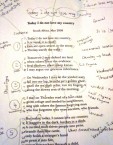In an unsolicited commentary offered to SLiPnet, UCT professor of creative writing Joan Hambidge describes Leon de Kock’s novel, Bad Sex, as a complex account of wounding that is spoken in a confessional male voice. Hambidge reads the novel through a psychoanalytic lens and finds that the story is a frame narration which turns the reader into an accomplice, at once analyst and analysand.
Karen Scherzinger reviews Shaida Kazie Ali’s debut novel Not a Fairy Tale, which was awarded the UJ Literary Prize for best debut two weeks ago, and speculates about the implications of the novel’s ambiguous ending.
Karlien van der Schyff reports on the launch of Ingrid de Kok’s fifth volume of poetry, Other Signs, at the Book Lounge last week and discusses Antjie Krog’s public analysis of De Kok’s poem “Today I do not love my country”.
Stellenbosch doctoral candidate Wamuwi Mbao gives Sifiso Mzobe’s prize-winning novel Young Blood a mixed report card, finding the novel innovative in parts, but also predictable in certain key areas of fictional depiction.
Dominique Botha’s travel blogs are fast becoming a regular high-point in the life of SLiPnet. This week, she interlaces two generations of her land-rooted South African family’s experiences in Europe in a travelogue whose incidentally brilliant writing (or so it appears) will once again make good writers everywhere want to weep with envy.
The gangster figure just won’t go away in South African imaginary constructs, film and fiction in particular. Why is this so? What are we “consuming” when we return, over and over again, to such depictions? Now it’s Mzobe’s Young Blood. Last season it was something else. This is the question that is searchingly explored by Wamuwi Mbao in a blog.
 SLiPStellenbosch Literary Project
SLiPStellenbosch Literary Project 












